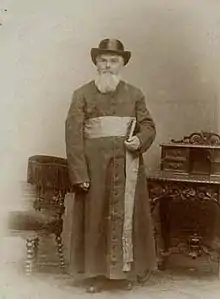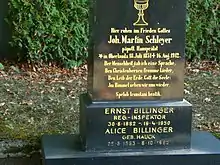Johann Martin Schleyer
Johann Martin Schleyer (German: [ˈjoːhan ˈmaʁtiːn ˈʃlaɪɐ]; 18 July 1831 – 16 August 1912) was a German Catholic priest who invented the constructed language Volapük. His official name was "Martin Schleyer"; he added the name "Johann" (in honor of his godfather) unofficially.
Johann Martin Schleyer | |
|---|---|
 | |
| Born | Martin Schleyer 18 July 1831 |
| Died | 16 August 1912 (aged 81) |
| Occupation | Catholic priest |
| Known for | Volapük |
Life and work
Schleyer was born in Oberlauda (Baden). According to his own report, the idea of an international language arose out of a conversation he had with one of his parishioners, a semi-literate German peasant whose son had emigrated to America and could no longer be reached by mail because the United States Postal Service could not read the father's handwriting.
He was ordained in 1856. From 1867 to 1875, Schleyer served as pastor at Krumbach near Meßkirch. At the end of this time he was jailed for four months for preaching against socialism during the Kulturkampf.
From 1875 to 1885 he was pastor of Ss. Peter and Paul parish in Litzelstetten. He later wrote that the first seven years in Litzelstetten were among the happiest of his life.
At this time he was editor of the magazine Sionsharfe, devoted mainly to Catholic poetry. In May 1879 he published an article on Volapük in this magazine. This sketch was followed by a full-length book in 1880. The language spread widely and new clubs sprung all over Europe. After 1885 Schleyer had to retire from his pastoral duties due to ill health, though he was still involved in the Volapük movement until it fell apart a few years later.
In 1894 Pope Leo XIII made him a papal prelate.
Schleyer died in Konstanz in 1912.
Remembrance


A campaign to beatify him was started in June 2001, based in his home parish of Litzelstetten.[1] The high school Martin-Schleyer-Gymnasium Lauda-Königshofen in Lauda is named for him.
References
- "Dio Benu 46-2/2002". www.ikue.org. Retrieved 30 September 2017.
External links
- Works by or about Johann Martin Schleyer at Internet Archive
 Media related to Johann Martin Schleyer at Wikimedia Commons
Media related to Johann Martin Schleyer at Wikimedia Commons- Information on Schleyer and the campaign for his beatification Archived 2007-09-28 at the Wayback Machine
- (de) Johann Martin Schleyer at the Website of catholic Erzdiözese Freiburg